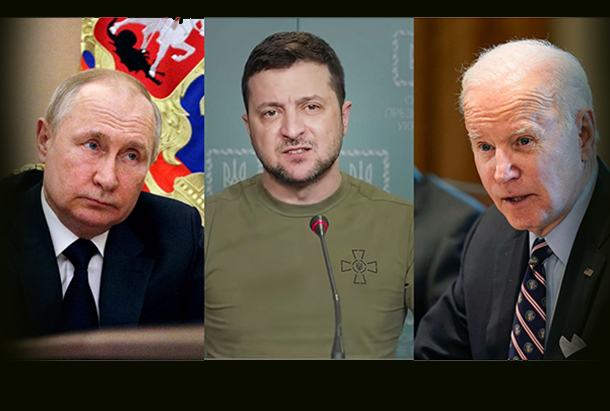Kiev rejected ‘Finlandisation’, but it was almost certainly a better deal than the one it will get now.

Fyodor Lukyanov writes…
Last week’s statements by David Arakhamia – who took part in the Russian-Ukrainian negotiations to end the armed conflict a year and a half ago – have caused a stir. The leader of Ukraine’s parliament only said what had been uttered by others before, but his input, for the first time, delivered official confirmation from Kiev.
Firstly, he admitted that the main issue at that time was military and political security – the guaranteed neutral status of Ukraine. As we know from the words of Russian President Vladimir Putin (during a meeting with an African delegation in June), those present also talked about specific parameters for limiting Ukraine’s military potential. Secondly, Arakhamia reported on the position of then-British Prime Minister Boris Johnson, who, either on his own initiative or on behalf of the collective West, was in favor of continuing the war to a victorious conclusion.
We will refrain from making a political assessment of the decisions taken by the Ukrainian leadership. What is more interesting is the substantive side of the negotiations, which we can now assess more fully.
We will refrain from making a political assessment of the decisions taken by the Ukrainian leadership. What is more interesting is the substantive side of the negotiations, which we can now assess more fully.
A month and a half or two months after the start of hostilities, Ukraine was offered what the more moderate Western commenters suggested in 2014, after the beginning of the acute crisis around Donbass – ‘Finlandisation’. In other words, a guarantee of the country’s security and independence in exchange for written down restrictions on its military and political status. An example of this was the agreements between the USSR and Finland after the Second World War, when Helsinki retained its sovereignty and almost complete independence (and also gained trade and economic preferences), and voluntarily agreed to stay away from Western alliances. In the second half of the 1940s, this arrangement was seen as a great achievement for Finland, since the alternative was to incorporate the country into the Soviet sphere of influence, with all the consequences that would entail. Such as the establishment of a ‘people’s democracy’ and strict adherence to the USSR’s foreign policy.
In the last decade, very few people were ready to discuss such a model in relation to Ukraine. They were pretty much followers of the school of realism in international relations (the late Henry Kissinger was considered its personification), but believers by no means included all of them. Some of those who believe in the balance of power, in principle, did not consider it necessary to apply the approach in this case. After all, Russia was considered too inferior to the West’s total potential to seriously take its military-strategic interests into account.
Most Western politicians and strategists now adhere to a completely different ideology: Balance of power and geopolitical compromises are a legacy of the past and only ideological categories are relevant today. In their thinking, ‘the free world’ prevails over the ‘unfree’, and that’s it. So, the West’s general post-Cold War line has not changed – to expand its own military-political institutions regardless of anyone’s objections.
It should be noted that these discussions on security systems were conducted mainly in the West, especially in the United States. In fact, in the Ukrainian political and public sphere, where stakeholders should have been the most interested in a good outcome, there was almost no debate. There was a clear and unchanging policy from the very beginning of independence for maximum separation from Russia, and it received direct approval and support from the West. The alternative was a much more flexible and amorphous concept (which for some reason was considered pro-Russian), the essence of which (real, not declared) was reduced to constant maneuvering and the evasion of any obligations – whether proposed or even already agreed upon.
For those in the first camp, ‘Finlandisation’ remained unacceptable, as it would have acted as a brake on distancing from Russia and rapprochement with the West. And the adherents of the second viewpoint were not really suitable as interlocutors, since this model still envisages rigid compliance with the agreed parameters. The task of the ‘flexible’ forces was to prevent any rigidity of commitments or to get out of them at the first opportunity. In general, the peculiarity of Ukrainian political culture, which regards all agreements as intermediate rather than final, has left a noticeable mark on the entire history of country since the end of the USSR. And, at the very least, it has contributed to the sad state of affairs that we have to face today.
It seems that under the conditions of the ongoing hostilities, in which both sides (but the Ukrainian side to a greater extent) have suffered major casualties, the ‘Finnish’ variant should have attracted more and practical attention. However, the two phenomena described above interacted here. On the Western side – the inadmissibility of revising the results of the Cold War, i.e. taking into account Moscow’s dissenting point-of-view. On the Ukrainian side – the rejection of any binding agreements. So, the outcome was a foregone conclusion.
Now that the specter of some kind of ceasefire talks is beginning to hang over the West, it is impossible to go back a year and a half. In a way, the situation has been simplified – the issue will be resolved on the battlefield and the outcome will be determined in the traditional way. Nevertheless, sooner or later, the question of a political solution will arise again. And its resolution will depend on the ability to draw lessons from what has happened. Or, the inability, as may be the case.
This article was first published by Rossiyskaya Gazeta newspaper, translated, edited and published at RT International.
Author Fyodor Lukyanov is one of the most prominent Russian experts in the field of international relations and foreign policy. He has worked in journalism since 1990 and is the author of numerous publications on modern international relations and Russian foreign policy. Since 2002, he has been the editor-in-chief of Russia in Global Affairs – a magazine conceived as a platform for dialogue and debate among foreign and Russian experts and policymakers. In 2012, he was elected Chairman of the Presidium of the Council on Foreign and Defense Policy of Russia, one of the oldest Russian NGOs. Since 2015, he has been the Director for Scientific Work of the Foundation for Development and Support of the Valdai International Discussion Club. He works as a research professor at the Faculty of World Economy and Global Politics at the National Research University Higher School of Economics. Follow him on Telegram and read Russia in Global Affairs.
READ MORE UKRAINE NEWS AT: 21st CENTURY WIRE UKRAINE FILES
ALSO JOIN OUR TELEGRAM CHANNEL
SUPPORT OUR INDEPENDENT MEDIA PLATFORM – BECOME A MEMBER @21WIRE.TV
















